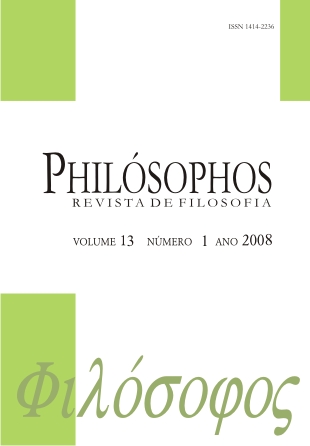ALGUMA LUZ PARA O FUNDACIONISMO?
DOI:
https://doi.org/10.5216/phi.v13i1.5773Palavras-chave:
fundacionismo, justificação, falibilismo.Resumo
O fundacionista precisa lidar com dois problemas fundamentais: (i) explicar como um item justificador provê justificação sem ele mesmo precisar de justificação e (ii) determinar o estatuto epistêmico do item justificador básico. Burdzinksi (Burdzinski 2007), na mesa linha de Sellars e Bonjour, argumenta que a experiência perceptiva não tem como ser uma resposta ao primeiro problema, pois, se o seu conteúdo não for proposicional, ela não provê justificação, e se for, ela tanto provê quanto carece de justificação. Minha proposta é que a experiência perceptiva justifica em virtude da sua natureza representacional. O ato de tomar o conteúdo de uma percepção pelo seu valor de face está justificado até que haja uma razão em contrário, ou seja, este ato está justificado prima facie. Isto nos força a responder o segundo problema afirmando que o justificador básico não é infalível. Esta resposta falibilista desagrada ao cético, mas é a melhor resposta fundacionista ao regresso epistêmico.Downloads
Downloads
Publicado
Como Citar
Edição
Seção
Licença
Autores que publicam nesta revista concordam com os seguintes termos:
- Autores mantêm os direitos autorais e concedem à revista o direito de primeira publicação, sendo o trabalho simultaneamente licenciado sob a Creative Commons Attribution License o que permite o compartilhamento do trabalho com reconhecimento da autoria do trabalho e publicação inicial nesta revista.
- Autores têm autorização para assumir contratos adicionais separadamente, para distribuição não-exclusiva da versão do trabalho publicada nesta revista (ex.: publicar em repositório institucional ou como capítulo de livro), com reconhecimento de autoria e publicação inicial nesta revista.















